California Troops Catch Some Waves at Annual Surfing Campout
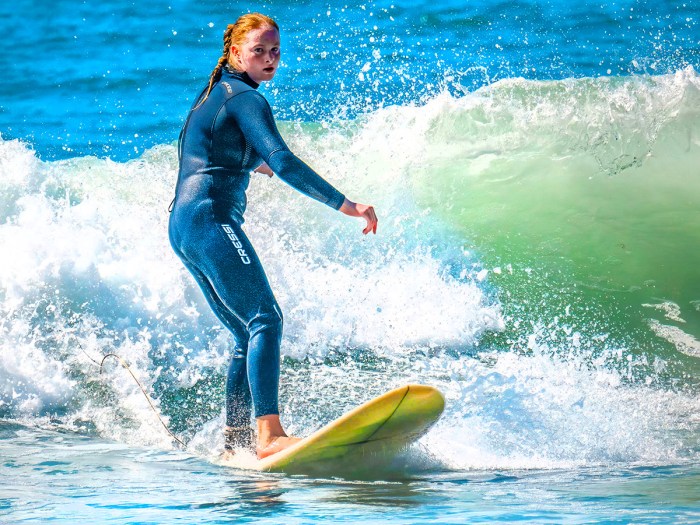
Sarah Marks coasts on a wave at Surf Camp, an annual Troops 506 campout.
Patrick Kozak watched the waves. They weren’t as tall as they had been early that morning, but some still reached a couple feet high before breaking into frothy whitewash. He could definitely ride them.
This was his second time at Surf Camp, a yearly tradition for linked Troops 506 of La Jolla, California. It’s the most relaxing campout of the year — hanging out with friends, playing games and splashing around in the ocean. But the adrenaline starts pumping when you’re on your surfboard and a good wave approaches.
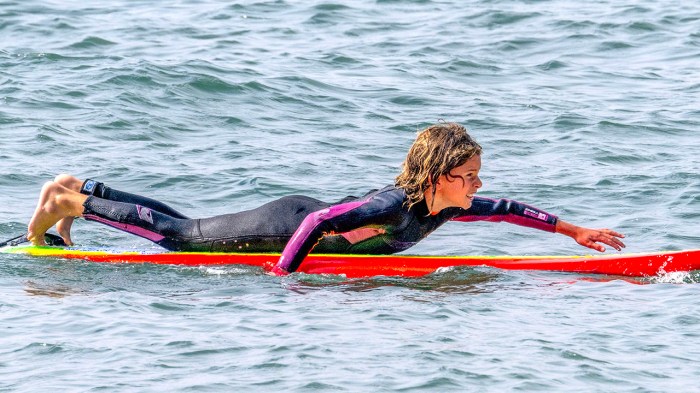
“I was catching some of the waves, but I was falling off of them,” the 14-year-old First Class Scout says. “It’s still fun to catch one. I hope I can get good enough.”
All it takes is practice, which requires a lot of wipeouts. Even if they didn’t conquer massive barreling waves by the end of the weekend, the Scouts still had fun.
“Every day on the water is a good day,” says Nolan Hood, 17, a Life Scout.
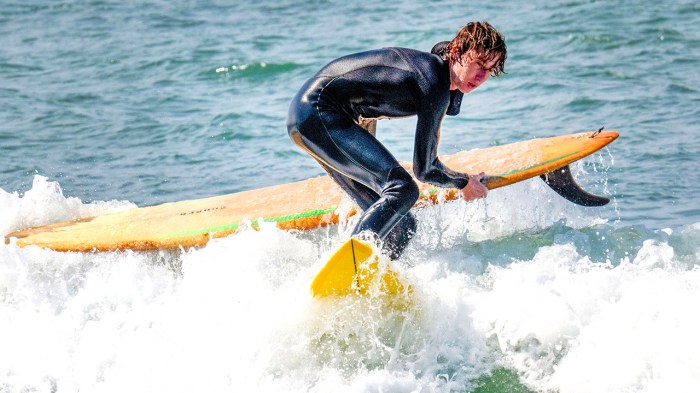
Nolan Hood practices a trick move by starting on one board before jumping to a smaller surfboard.
SAFETY FIRST AT SURFING CAMPOUT
La Jolla is on the Southern California coast, so some Scouts in the troop have become well-versed in aquatics from lifeguard training and surfing with friends and family.
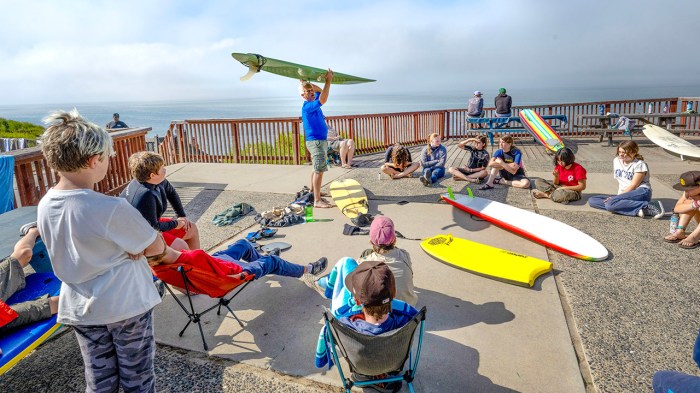
Adult leader Brian Catanzaro reviews surfing safety before the Scouts get into the water.
In preparation for Surf Camp every fall, the troop reviews surfing safety, studying the dangers of rip currents, underwater hazards and stinging animals like jellyfish and stingrays.
“Surfing has a learning curve,” says Marcus Catanzaro, 16, a Life Scout. “We go through the swim test. We go over safety aspects on dry land.”
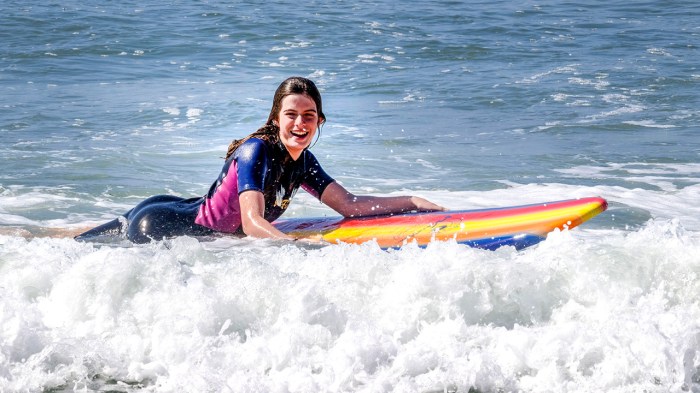
Amaya Pfister tried surfing for the first time at Surf Camp
The troop camped within walking distance of the beach — close enough that they could hear the ocean. They leisurely got up, enjoyed doughnuts the adult leaders bought, and practiced surfing techniques on land before wading into the water.
“It’s hard to get up on your board, so you practice on the sand,” says Second Class Scout Beatrice Nicholson, 13. “There’s a way you can practice lying down and then getting to your feet in one smooth motion.”
When the Scouts felt ready, they grabbed their boards and got in.
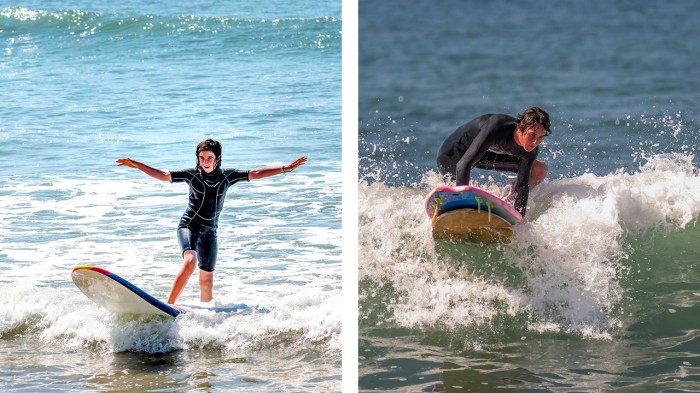
Left: Eris Pfister surfs on a foam longboard, riding the waves all the way to the shore at Surf Camp. Right: Alex Markworth catches a wave on two boards. His plan: Jump from one board to the other without falling!
MAKING WAVES
Your surfboard matters. Longboards — which measure 8 feet and more — work best on big waves, while shortboards — about 5 to 7 feet long — let you move around quicker and easier.
“If it’s a lower tide, the shortboards are more maneuverable,” says Life Scout Alex Markworth, 16. “With longer boards, it’s speed and enjoying the wave rather than riding it out.”
Ultimately, it’s personal preference of how you want to attack the surf and how much you want to spend. Shortboards made of polyurethane foam cost a couple hundred dollars, while prices for fiberglass longboards can reach about $1,000.
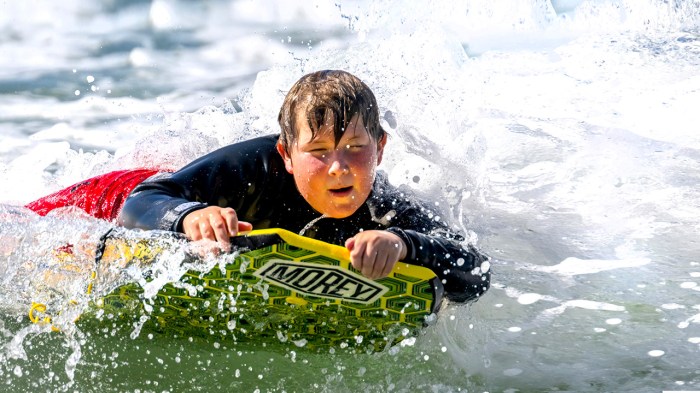
Max Hayfen rides a wave on his boogie board.
You can also use a bodyboard or “boogie board” to ride across the waves, but you aren’t standing up on these since they’re often 2 to 3 feet long. Or you can go without a board at all.
“I wanted to try body surfing,” says Emma Zackowski, 13, a First Class Scout. “Body surfing is where you don’t have a board — you just ride the wave by yourself.”
Wind often creates waves while sandbars and underwater reefs can alter the shape and intensity of the waves. During the campout, the ocean offered small waves with whitewash to ride through; however, a few big ones formed, too.
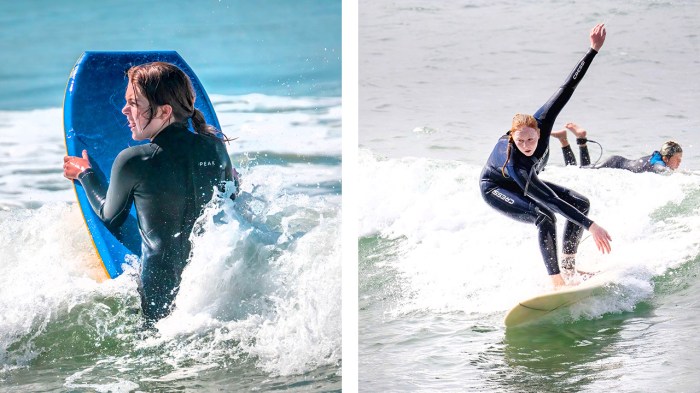
Left: Emma Zackowski splashes through a wave. Right: Sarah Marks drops in on a wave.
“It was good for the variety of surfers we had,” Alex says.
When Scouts weren’t trying to ride the waves, they were paddling over to a lagoon outflow, which created a lazy river where they could float.
“Surf Camp is fun,” says Jacob Jones, 16, a Star Scout. “You just go and chill out there.”
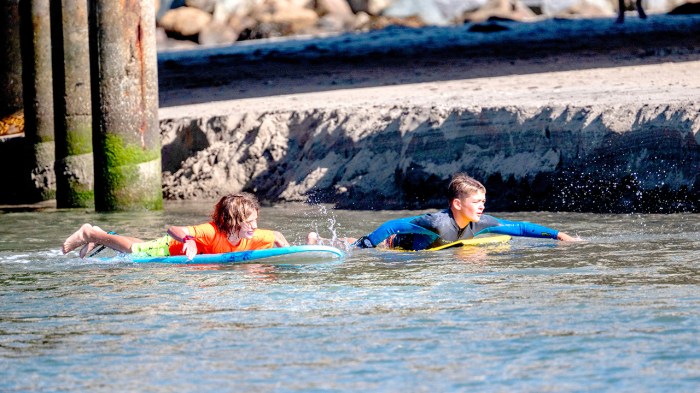
Trevor Forrest and Massimo De Soto paddle up a lagoon outflow.
JUST CHILLIN’ AT SURFING CAMPOUT
Surfing wasn’t the only item on the troop’s agenda at the surfing campout. There were also card games, flying disc games, volleyball, bracelet-making, pizza, guitar-playing and hanging out by the campfire. Some Scouts worked on their Totin’ Chip or the San Diego-Imperial Council Wave Rider award, an honor focused on the basics of surfing and bodyboarding. For the Wave Rider award, Scouts study surfing safety and demonstrate certain techniques.
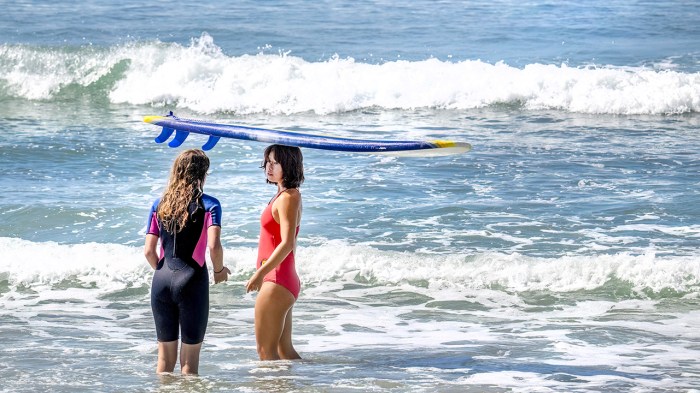
Amaya Pfister (left) and Jacqueline Long take a break from the waves. Jacqueline worked as a junior lifeguard for several years, which helped her gain confidence in the water.
“I only have two years of surfing. It’s gotten easier,” says Eris Pfister, 12, a Scout. “It’s like snowboarding: It’s hard, but once you get the hang of it, you get the hang of it.”
And even if you haven’t gotten the hang of it by the end of the weekend, you can go to Surf Camp again next year to enjoy activities, both on land and in the sea.
“It’s definitely one of my favorite campouts,” says Amaya Pfister, 14, a First Class Scout.
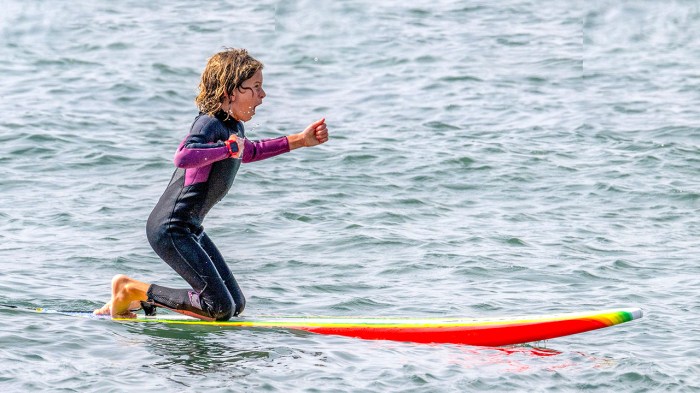
Massimo De Soto celebrates riding a great wave.
A Rare Sight
The weekend Troop 506 went surfing coincided with an annular solar eclipse. A solar eclipse occurs when the moon passes between the sun and Earth, blocking sunlight. Unlike total eclipses, during which the moon completely covers the sun, an outer ring of the sun remains visible during annular eclipses.
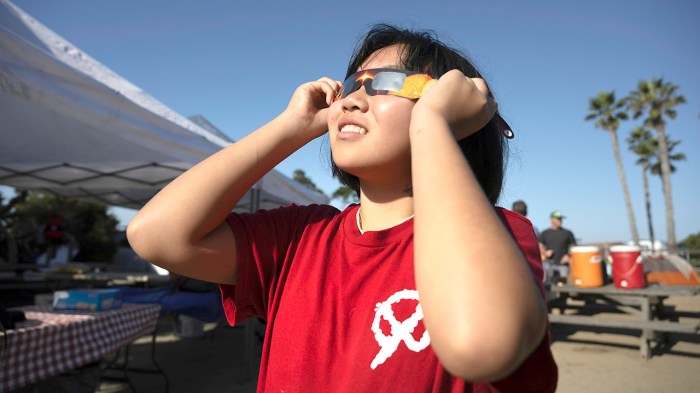
Phoebe Yasuhara views the solar eclipse.
To protect their eyes, the Scouts used solar eclipse glasses and built an eclipse viewer.
“We saw the eclipse looking through a cereal box,” says Eagle Scout Emilio De Soto, 13. “It’s easy to make. The sun shines through, and you can basically see a dot on a white piece of paper.”
The stunning pics & heartening article makes me grateful for all Scouting can offer to those fortunate to participate. Thanks for capturing the magic of this event! I’ve never been but will be going this year! 🙂
Thanks so much for covering this event. It has been going on for over a decade!